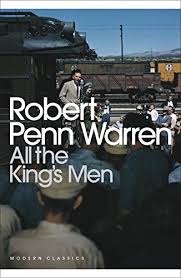All the King’s Men by Robert Penn Warren
1946
‘All the King’s Men’ is the story of the rise and fall of Governor Willie Stark in 1930’s America. The novel is narrated by Jack Burden, one of Stark’s assistants and “fixers”, who offers a detached, sardonic commentary on Stark’s progress to become Governor of his State. Stark starts his political life as a honest man, but through a series of compromises he slowly becomes the thing he once stood against:
“Politics is a matter of choices, and a man doesn’t set up the choices himself. And there is always a price to make a choice. You know that. You’ve made a choice, and you know how much it cost you. There is always a price.
Stark appears to be a broadly progressive figure, on the side of the “little man”, introducing reforms designed to tax the rich and ease the burden of the state’s poor farmers. But despite his considerable popularity, the burden of power slowly but inevitably corrupts him, leading eventually to his demise. He never becomes a monster, but he makes a series of compromises and decisions which once taken can’t be reversed.
While Stark is the novel’s focus, the unobtrusive narrator slowly unravels his back story. Burden uses his experience as a historical researcher to dig up material to allow Stark to blackmail a former family friend, Judge Irwin. This sets in train the tragic series of events that leads to Stark’s downfall, and that of several other characters. In a distributing flashback scene, in which Burden explains how he developed his investigative skills, we are told the story of his ancestor’s involvement in the slave trade.
As a narrative character Burden, his name heavily symbolic, is reminiscent of that other observer of the tragic fall of a charismatic figure, Nick Carraway. Even the way he ends the novel
And soon now we shall go out of the house and go into the convulsion of the world, out of history into history and the awful responsibility of Time”
calls back to Fitzgerald’s only slightly more memorable and evocative line
“So we beat on, boats against the current, borne back ceaselessly into the past.”
Warren was America’s first poet laureate, and it shows. His prose style is luxurious and elegiac, powerfully evoking the 1930’s Deep South landscape. His use of imagery is extremely strong –
“So I pulled the sun screen down and squinted and put the throttle to the floor. And kept on moving west. For West is where we all plan to go some day. It is where you go when the land gives out and the oldfield pines encroach. It is where you go when you get the letter saying: ‘Flee, all is discovered’. It is where you go when you look down at the blade in your hand and see the blood on it. It is where you go when you are told that you are a bubble on the tide of empire. It is where you go when you hear that thar’s gold in them-thar hills. It is where you go to grow up with the country. It is where you go to spend your old age. Or it is just where you go.”
He handles the big themes running through the novel comfortably, and while the prose sometimes teeters on the edge of taking itself too seriously, it always avoids being pretentious. Mainly this is achieved by Burden’s knowing commentary – at times he reminded me of that other great cynical poet of pre-war American life, Philip Marlowe.
“There was nothing particularly wrong with them; they were just the ordinary garden variety of human garbage” could have come straight out of the best of Chandler.
I really enjoyed this novel. Warren is an author I had not heard of before, embarrassingly, but I am pleased to have now remedied that omission. It is a powerful, tragic story. The n-word is used extensively, as is sadly common in novels of this time and place, but with that one caveat I can thoroughly recommend it.
THE READING BUG


No comments:
Post a Comment